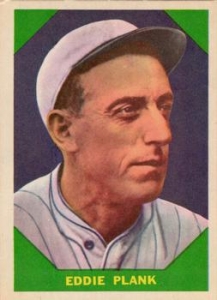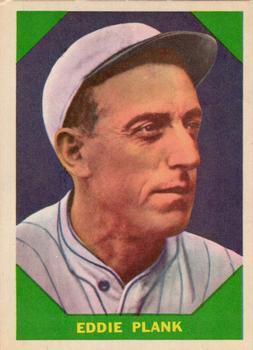September 27, 1912: Hall of Fame pitchers’ duel as Senators beat A’s in 19-inning marathon
 Eddie Plank won 326 games in the major leagues – and a game in which he pitched 16 scoreless innings wasn’t one of them. That stretch of shutout pitching came in a game that went 19 innings and lasted more than four hours before the Athletics’ Hall of Fame lefty lost to another Hall of Famer, Washington’s Walter Johnson.
Eddie Plank won 326 games in the major leagues – and a game in which he pitched 16 scoreless innings wasn’t one of them. That stretch of shutout pitching came in a game that went 19 innings and lasted more than four hours before the Athletics’ Hall of Fame lefty lost to another Hall of Famer, Washington’s Walter Johnson.
The late-season contest matched the teams battling for second place behind the Boston Red Sox, who had already clinched the American League pennant. Washington’s starting pitcher was Bob Groom, who had won his previous nine starts, pitching complete games in all of them, to improve his record to 23-12. Plank took the mound with a record of 26-5, ranking third in the major leagues in wins behind Johnson and Boston’s Joe Wood.
The Senators started the game intent on extending Groom’s winning streak and increasing their 1½-game lead over the A’s. With one out in the top of the first, Eddie Foster singled and Clyde Milan followed with a bunt single, with Foster taking second. Both runners advanced on a groundout by Chick Gandil, and Foster then came home on Plank’s wild pitch.1
Plank was shakier in the second inning. Howie Shanks led off with a double. George McBride laid down a bunt, and when A’s third baseman Frank “Home Run” Baker muffed catcher Ben Egan’s throw to third, there were runners on the corners. Rip Williams singled to score Shanks, McBride stopping at second, and both runners moved up on Groom’s sacrifice. Danny Moeller then hit a groundball to A’s shortstop Jack Barry, and when McBride beat Barry’s throw home, it was 3-0, Washington. Foster followed with a single to score Williams and send Moeller to third.
But Plank got out of the inning, even as manager Connie Mack had a substitute warming up, when Milan grounded to Baker, whose throw home retired Moeller after a rundown, and Gandil flied out. And over the next six innings, Plank allowed just one hit, a single by Gandil in the fifth.
Plank’s pitching was accompanied by a torrent of invective from Senators manager Clark Griffith and coach Germany Schaefer from the coaches’ boxes. They “kept up a continuous stream of remarks to the twirler,” according to a report in the Washington Times. “Some of these remarks were hardly polite.”2 And they were probably easy to hear, since the Washington Herald reported there were fewer than 500 people in the stands for the game.3 “Griffith and Schaefer kept up a constant cross-fire of remarks,” wrote William O. Weart in The Sporting News, “but the more they chattered, the harder Plank stuck to his work.”4
Meanwhile, the A’s kept putting runners on base, but couldn’t bring any of them home. They loaded the bases with one out in the second, but Baker got a bad jump trying to score on a long fly ball by Jack Lapp, batting for Egan, and was thrown out at home. The A’s got three hits in a row in the fifth, but Lapp, who got the first of them, was picked off second and the A’s never got a runner as far as third. Then Philadelphia loaded the bases with no one out in the sixth before Barry lined into a double play and Lapp grounded out.
The A’s finally got on the board in the seventh, when Plank and Harl Maggert singled, Eddie Collins walked, and Plank came home on Baker’s groundout. But it was still 4-1, Washington, going into the ninth.
It looked as though the Senators would add to their lead in the ninth. Williams led off with a double and went to third on Groom’s sacrifice. But right fielder Eddie Murphy caught Moeller’s line drive and threw out Williams trying to score.
Groom took a three-run lead into the bottom of the ninth … and couldn’t hold it. Murphy opened the inning with a single off Groom’s glove. After Maggert flied out, Collins reached on an infield hit and Baker slammed a pitch to right that hit the wall, missing a home run by just a few feet. Murphy scored but Collins was held at third. Stuffy McInnis followed with a groundout to McBride at short, scoring Collins, to bring the A’s within one run with two out. Rube Oldring followed with a hot shot to third that got by Foster for the A’s 16th hit off Groom, and Baker came home to tie the game. (This was Oldring’s first game in more than three weeks; Mack had suspended him without pay, supposedly for the rest of the season, for being out of condition, but with second place on the line, Mack brought him back for this game.5)
The game stayed tied for the next nine innings, as Plank found himself dueling with Johnson. The A’s and Senators were supposed to play a doubleheader on this day, with Johnson scheduled to pitch the second game, but with Groom struggling, Johnson entered the game to start the bottom of the 10th. Just the day before he had pitched 2⅔ innings in relief. The 24-year-old had already won 31 games in 1912 and was on his way to leading the American League in strikeouts and earned-run average.
Johnson pitched his way out of jam after jam as the game proceeded through extra innings. In the 11th inning Maggert got to third with one out but was thrown out at the plate trying to score on a short passed ball. Collins tripled with two out in the 13th, bringing McInnis to the plate. “Naturally [Senators third baseman] Foster played deep, for [McInnis] hits hard in that direction, so that when a slow swinging bunt came down his way it looked as if the game was over,” J. Ed Grillo wrote in the Washington Evening Star. “Foster, however, came in at full speed, grabbed the ball with one hand and without steadying himself made the throw to first and got his man. It was one of the fastest plays ever made by a third baseman.”6
In the 14th Lapp doubled with two out, but Plank, given a chance to win his own game, struck out. Then in the 16th, Baker led off with a single, after which McInnis got a base hit to right. Even though his run would not matter, McInnis tried to stretch the hit to a double and was thrown out at second, with Baker stopping at third. Johnson then fanned Oldring and Barry to end the inning.
The visitors had a few scoring chances of their own in extra innings, but Plank kept them off the board. The Senators had runners on second and third with one out in the 14th, but Johnson struck out and, after Moeller walked to load the bases, Foster flied out. McBride led off the 16th with a double but was doubled up after a lineout by Williams. Then in the 18th, McBride beat out a bunt with two out, and when he took off to steal, Lapp threw wildly into right field. McBride tried to come all the way around to score, but Murphy’s throw home just beat him to end the inning.
Plank took the mound at the start of the 19th having held the Senators scoreless for the previous 16 innings, but the Senators would score the winning run without hitting a ball out of the infield. Williams led off with a walk, and when Johnson laid down a bunt, Plank overran the ball and Johnson was safe at first. Moeller then hit one back to Plank, who threw to third to force out Williams. Foster – the 74th batter to face Plank in the game – hit a groundball to short, and Barry threw to Collins at second to force out Moeller for the second out, but when Collins threw to first (“foolishly,” according to the Washington Post’s Joe S. Jackson, as he had “practically no chance” to retire Foster), his throw bounced off McInnis’s body and Johnson came home with the tiebreaking run
The Big Train then retired the A’s in order in the bottom of the inning to wrap up his 32nd win; he would pitch a complete game in a win against the New York Highlanders six days later to finish the season with a record of 33-12. For Plank, the appearance would be his last of the season, as he finished with a record of 26-6. He allowed 13 hits over 19 innings, while his teammates piled up 24 hits plus six walks, but left 19 men on base and couldn’t find a way to win the game.
SOURCES
Game accounts were found at Newspapers.com. The Sporting News was accessed via PaperOfRecord.com.
NOTES
1 Joe S. Jackson, “Nationals Win Game in Nineteenth Inning,” Washington Post, September 28, 1912: 8. This is the source of all play-by-play information unless otherwise noted. Milan’s hit being a bunt is noted in William Peet, “New A.L. Record When Nationals Trim Athletics in 19 Innings,” Washington Herald, September 28, 1912: 10.
2 “Senator,” “Nineteen Innings to Decide Game,” Washington Times, September 28, 1912: 14.
3 Peet.
4 William O. Weart, “Spoil Quaker Fans,” The Sporting News, Oct. 3, 1912: 1.
5 Peet; Bill Bishop, “Rube Oldring,” SABR Baseball Biography Project, sabr.org/bioproj/person/71f1da1c.
6 J. Ed Grillo, “Second Place Now Seems Assured for Nationals,” Evening Star (Washington), September 28, 1912: 9.
Additional Stats
Washington Senators 5
Philadelphia Athletics 4
19 innings
Shibe Park
Philadelphia, PA
Box Score + PBP:
Corrections? Additions?
If you can help us improve this game story, contact us.


